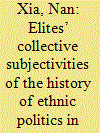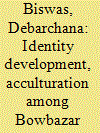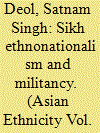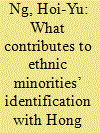|
|
|
Sort Order |
|
|
|
Items / Page
|
|
|
|
|
|
|
| Srl | Item |
| 1 |
ID:
166624


|
|
|
|
|
| Summary/Abstract |
Malaysia is one of the multi-ethnic, multi-cultural and multi-religious countries in Southeast Asia. Due to the pluralistic nature of Malaysia, it has a political structure based on ethnic politics. The ethnic preferential policies affected most domains of this country. The objective of this article is to examine the origin and background of ethnic politics in Malaysia. Findings of this study indicate that, ethnic politics originated during the British colonial period, it became a tool used by the Barisan Nasional for the legitimacy of regime. Moreover, ethnic politics in Malaysia today is intertwined with religion. Besides, there is the dilemma of the choice between the interest of certain ethnic group and national interests. However, with the opposition coalition Pakatan Harapan won the election in 9th May, UMNO-led BN lost power and interrupted its 61 years control, which leaves us an interesting topic to think about the future of Malaysian ethnic politics.
|
|
|
|
|
|
|
|
|
|
|
|
|
|
|
|
| 2 |
ID:
166628


|
|
|
|
|
| Summary/Abstract |
The development of identity is a procedure of individual change that can take place along various spheres of social and cultural domains. The concept of identity is always remaining fundamental in the process of acculturation and adaptation. The prominence or value has been particularly given on Chinese community of Bowbazar which is an enclave community. The study aims to elucidate that the immigrant groups adjust to the host society by persistent identity development especially by adjusting and adapting to altered or homogenize identity which is most supported along with the integration strategies. The study has been conducted on the basis of qualitative approach as well as quantitative approach. Responses from the community revealed, that the Chinese community of Bowbazar Chinatown through ages is not only able to adapt ideals, values, and behaviors of host culture but also able to retain their ideals, values and beliefs of their own cultures of origin.
|
|
|
|
|
|
|
|
|
|
|
|
|
|
|
|
| 3 |
ID:
166622


|
|
|
|
|
| Summary/Abstract |
The article aims to shed light on mosque communities in Russia through the example of mosques frequented by Moscovites and by Central Asian migrants. I will make use of Anderson’s theoretical framework of ‘imagined community’ in analysing the material presented in the article. The main argument is that there are no real mosque communities and rather that the sense of community formed around mosques is imagined. There are nevertheless a variety of networks, groups and institutions within and around mosques. The article is based on fieldwork conducted in 2016 and 2017.
|
|
|
|
|
|
|
|
|
|
|
|
|
|
|
|
| 4 |
ID:
166625


|
|
|
|
|
| Summary/Abstract |
The study primarily answers the question that whether the movement of Sikh ethnonationalism had been defeated permanently during 1990s or whether it still persists? The study perceives that the movement of Sikh ethnonationalism cannot end till the core pivotal ethnic issues, the moving force of the movement are prevailing. The study eventually predicts that the movement will sooner or later rejuvenate from its previous stage, i.e. militancy, as the sociopolitical circumstances of Punjab have been nourishing microclimate for resurgence of the same. In typical political scenario, the moderate outfit of Sikhs is eager to stimulate the ethnic-regional issues of the Sikhs while the radical factions are also observant to ignite the clinkering Sikh ethnic issues once again. Contrarily, the political aspirations of the BJP controlled by the RSS are opposite to the ethno-political demands of the Sikhs. This contradiction, if aroused systematically, has the potential to rekindle the old spark of militant movement.
|
|
|
|
|
|
|
|
|
|
|
|
|
|
|
|
| 5 |
ID:
166623


|
|
|
|
|
| Summary/Abstract |
The initiation of political reforms and a peace process in Myanmar has fundamentally altered the conditions for Burmese diasporic politics, and diaspora groups that have mobilized in Myanmar’s neighbouring countries are beginning to return. This article explores how return to Myanmar is debated within the Burmese women’s movement, a significant and internationally renowned segment of the Burmese diaspora. Does return represent the fulfilment of diasporic dreams; a pragmatic choice in response to less than ideal circumstances; or a threat to the very identity and the feminist politics of the women’s movement? Contrasting these competing perspectives, the analysis offers insights into the ongoing negotiations and difficult choices involved in return, and reveals the process of return as highly conflictual and contentious. In particular, the analysis sheds light on the gendered dimensions of diaspora activism and return, demonstrating how opportunities for women's activism are challenged, debated and reshaped in relation to return.
|
|
|
|
|
|
|
|
|
|
|
|
|
|
|
|
| 6 |
ID:
166626


|
|
|
|
|
| Summary/Abstract |
How can minority writers within China assert their own ethnolinguistic distinctiveness whilst also writing in Chinese? Ethnic minority works fall into two groups: writing in standard Chinese, and works in native scripts. Most ethnic minority writing that can go beyond the local level to connect with a national or even global audience is published in Chinese – hence the label ‘Sinophone’ writing. The Bai people are one such minority nationality within China, who live in and around the city of Dali in ethnically-diverse Yunnan Province. Despite having their own language, they are often cited as one of the most ‘Sinicised’ of China’s ethnic groups. This means that the Bai are caught between two linguistic and cultural worlds: a situation that is reflected in their writing. As they write in Chinese, they translate their own language and culture, inserting non-Chinese words and cultural context, creating a new hybrid written form.
|
|
|
|
|
|
|
|
|
|
|
|
|
|
|
|
| 7 |
ID:
166627


|
|
|
|
|
| Summary/Abstract |
The context of Hong Kong has not always been favourable for the integration of ethnic minorities, who face various difficulties in education, employment, and daily life. Research, however, has shown that many minorities, particularly the youth, have developed a fair sense of belonging to the city. To explore this puzzle, this study conducted semi-structured interviews with 20 South Asian and Filipino youth and identified four main factors that may be associated with their local identification. They are (1) experiencing less discrimination, (2) achieving a higher level of sociocultural adaptation, (3) having an inclusive conception of Hong Kong identity, and (4) claiming to have received more social benefits. The findings suggest that the context of Hong Kong is not entirely detrimental for ethnic minorities to develop a local identification. Ethnic minorities themselves are also active agents in the construction of identity. Theoretical and policy implications of the findings are discussed.
|
|
|
|
|
|
|
|
|
|
|
|
|
|
|
|
|
|
|
|
|